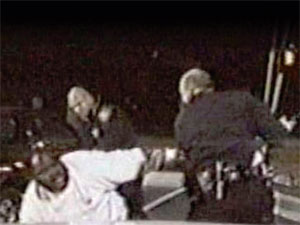'60 Minutes': DEA thwarted on opioid epidemic
The Drug Enforcement Administration’s attempts to curb the opioid epidemic as deaths increased were thwarted by powerful forces in Washington, according to a joint report by “60 Minutes” and The Washington Post.
The report, which airs at 7:30 p.m. Sunday on CBS, was previewed Friday morning on “CBS This Morning.” The story will appear in the Post’s Sunday edition.
Every day in this country, 91 people die in the crisis.
Reporters Bill Whitaker of “60 Minutes” and Scott Higham of The Post talked about the investigation, which makes the point that big companies have been complicit in the drug deaths.
Joe Rannazzisi, a former deputy assistant administrator, blasts distributors for fueling the epidemic and ignoring the deadly toll. “This is an industry that allowed millions and millions of drugs to go into bad pharmacies and doctors’ offices that distributed them out to people who had no legitimate need for those drugs,” he tells Whitaker.
How bad is the situation?
“This is an industry that’s out of control,” Rannazzisi said. “What they want to do is do what they want to do, and not worry about what the law is. If they don’t follow the law in drug supply, people die. That’s just it.”
In the preview Friday morning, the reporters said that DEA investigators were running up against a drug industry that’s incredibly powerful in Washington because of lobbying and spending in Congress.
Whitaker said the distributors ship the drugs and are required to keep track of every pill, but one West Virginia town of 300 people received 9 million opioid pills over several years.
“The DEA whistleblowers we talked to said that happened again and again and again,” Whitaker said.
The bottom line: The drug companies are more influential with lawmakers than their constituents’ suffering, Whitaker said.
The DEA people saw cases they were building languish and “die on the vine” in Washington because of lobbying, Higham said.
The report on “60 Minutes” will be double in length. The six-month investigation is also the work of Lenny Bernstein of The Post and ”60 Minutes” producers Ira Rosen and Sam Hornblower.
hboedeker@orlandosentinel.com and 407-420-5756.'60 Minutes' Blames The Pharmaceutical Industry For America's Heroin Epidemic
Sunday evening, 60 Minutes correspondent Bill Whitaker went to Columbus, Ohio, to understand America's heroin epidemic. The drug is becoming cheaper and easier to get, he argues, and its stigma is vanishing. But his reporting places much of the blame for the addictions and deaths he documents on opioid pain pills. People become addicted to the pills, and than switch to heroin because it is cheaper.
“I graduated in the 80s,” Tracy Morrison, a nurse, tells the newsmagazine. “I was a nursing director when we decided to swing the pendulum from not treating pain to treat everybody's pain. I was a part of that. And at that time, I had no idea that we were addicting people.”
Now Tracy has two daughters who are both addicts. One of them, Jenna, talks to 60 Minutes, saying she started on pain pills at 15 or 16 and progressed to heroin when she was 18. Eventually, she overdosed and almost died. But Whitaker finds more damning anecdotes. He talks to parents whose teenage children became addicted to opiates that were originally prescribed to them by their doctors. Tyler Campbell, for instance, was a high school football star. His parents said he became addicted to opiates after his doctor prescribed him 60 Vicodin for a shoulder surgery. (Vicodin and generic versions of it were, incidentally, the most prescribed medicine in the U.S. every year between 2009 and 2012.)
Some people are obviously becoming addicted to drugs like Oxycontin and Vicodin because they abuse them, without ever needing to take them for pain. And some are starting heroin because it is cheap, because the stigma that it once had is decreasing, and because it can be smoked or snorted, instead of injected, making it easier to use it at a party. And we should always be suspicious of the narrative 60 Minutes adopts here, that a drug that was once used by “other people” is now being used by “people like us,” or, as one of 60 Minutes’ telegenic subjects puts it, “even Miss America could be a junkie.”
And some people do need these drugs because of pain. “What about those POOR SOULS who need Pain KILLERS, but now cannot get them,” writes commenter CESNNEWYORK on CBS’ site. “I have had to SUFFER with [a] knee that needs to be replaced, but because DOCTORS are not ready issue these meds I have to SUFFER.”
The flip side of this pain and suffering is that prescription pain pills cause 16,000 deaths a year in the U.S., not counting those caused by heroin. How to we balance the benefit of these drugs against that clear risk? A terrifying letter published in The New England Journal of Medicine last week showed that even as the abuse of pain drugs like Oxycontin, Percocet, and Vicodin seems to have dropped off, it has been replaced by the use of heroin. Do we view that as the overuse (and marketing) of opioid pills causing heroin use, or as restrictions on needed drugs causing an increase in heroin use? Is it both?
Andrew Kolodny, the chief medical officer of addiction treatment facility Phoenix House, argued to me over email that those who switch to heroin may be better off than those who don’t. He says that older people who become addicted to painkillers have less trouble getting pills from doctors than teenagers, and that they are more likely to overdose than those who switch to heroin.










